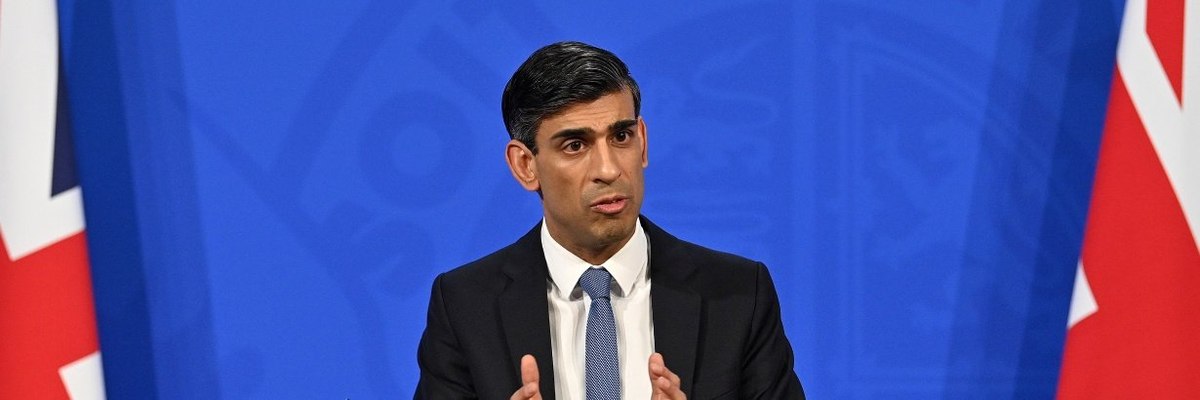There is one basic law of politics that has stood the test of time and we can safely predict always will. You can’t please all the people all the time. Even before Rishi Sunack stood up to deliver his so-called ‘mini budget’ speech he will have known what to expect. Half his listeners would be delighted that he had finally decided to help bail out all those people struggling desperately to make ends meet because of inflation and, above all, rampant increases in energy costs. The other half would be screaming at him: “Call yourself a Tory! Real Tories don’t give endless billions away: they cut taxes!” Where do you stand?
There’s no doubt that the Chancellor had to do something. The soaring costs of energy have meant that vast numbers of the poorest in the land have been facing the hideous choice between “heating and eating”. Too many people have been forced to resort to food banks to feed their children and themselves. Even the most hardline politicians have been force to acknowledge that something had to be done to help them. The question was: what?
One minister after another had rubbished the idea, pushed hard by Labour, of imposing a windfall tax on energy companies who’d been making huge profits and handing the proceeds to people who couldn’t pay their bills. In the end Sunak did exactly that. He couldn’t bring himself to call it a windfall tax – he called it a “temporary targeted energy profits levy” – but the euphemism fooled nobody. This was a government U-turn of pretty heroic proportions. Indeed, there was so much laughter in the House of Commons from the opposition benches that he struggled to finish his sentence. Later the Treasury acknowledged that the levy/tax could stay in place for as long as three years, which suggested that there would be yet more help in the longer term for people struggling to pay their energy bills.
In the immediate future every one of the 28 million households in England, Scotland and Wales will get a £400 discount on their energy bills. The cash will be paid directly into their accounts. Pensioners, disabled people and those on very low incomes will get considerably more. Families living on benefits will qualify for a £650 cost of living payment and pensioners will receive an extra £300 this winter to help pay their energy bills. Another six million disabled people will get extra payments worth £150. It means that a disabled pensioner on benefits will be eligible to receive payments of £1500 this year. There’s also a discount of £150 on council tax bills, taking the total for some to £1,650.
It’s not only the poorest who will benefit. People who own second homes will get the £400 energy grant for each home. And, of course, all pensioners will benefit from the increase in the winter fuel allowance. The Chancellor also announced that pensions and benefits will rise next year in line with the inflation rate this September. Given that inflation is already nudging 10 per cent that could be a whopping increase.
By the time you add it all up the total cost of the Chancellor’s largesse reaches £21 billion. Some of it will come from that windfall tax on energy companies but, as many of the Chancellor’s critics were very swift to point out, there’s no such thing as free money. Governments can raise taxes or they can borrow more. The best way to help people, they say, is to cut taxes. One Tory MP accused the Chancellor of “throwing red meat to socialists”. The former Tory leader Sir Ian Duncan Smith thought the package was a “good start” but he, too, said Sunak should start to cut taxes which, he pointed out, stand at a record level.
If the Chancellor had anticipated warm words for his generosity in the media he will have been disappointed. Even the staunchly Tory Daily Telegraph was profoundly sceptical. Its star columnist Fraser Nelson wrote: “It didn't sound like a Tory rescue plan. It sounded like the Conservatives offering terms of their intellectual surrender.” For Nelson, and many other Tory supporters, the “cornerstone of Conservatism is that the Tories cut taxes and Labour raise them.... After years banging on about the moral case for low taxation - the quaint idea that societies are fairer and stronger when people are allowed to keep more of the money they earn - the Tories have now given up. Handouts are preferred to general tax cuts, allowing the state to choose winners and losers....
Taxation is spoken of in moral terms: a tool to serve justice to stubborn companies making ‘excess’ profits.”
The Daily Mail had “serious concerns” about the Chancellor’s package too. It described it as “the sort of colossal redistributive programme more associated with socialism than conservatism, and there are very real fears it will push inflation even higher.... Tax and spend splurges like this cannot become a habit. They discourage investment, threaten jobs and restrict growth. BP is already saying it will review its UK investments because of the levy. At a time when we are trying to beef up energy security, that is troubling. In the two years to the next election, Boris Johnson must reach for more lasting solutions if he is to win public trust. This Chancellor has raised taxation to its highest level since the 1940s - with more green and corporate tax rises in the pipeline. It's time for a reset.”
Unsurprisingly, perhaps, the right-wing Taxpayers Alliance shared that view. Its chief executive John O’Connell noted that the government had form when it came to higher taxes. National insurance had ben hiked, corporation tax was soaring from 18 to 25 per cent and income tax thresholds had been frozen. And he asked this: “What is the point of 'robbing Peter' by hiking our taxes - and then 'paying’ Paul' by giving us a modest rebate on our energy bills?” He went on: “Lower taxes boost the economy, letting people spend where they see fit. You can't tax your way to higher growth, and you can't spend your way out of an inflation crisis. Had the Government remembered these basic economic lessons - especially since the gargantuan splashing of public cash during the pandemic - many people's finances would feel a lot less precarious than they currently do.” Mr O’Connell’s advice is simple: cut taxes now and the economy will grow and we shall all benefit.
Is it that simple? What’s your view on Rishi Sunack’s big giveaway? Even if it’s true that lower taxes help the economy grow stronger in the long run, what about the short run? What about those people who are genuinely struggling, through no fault of their own, to pay their bills in a time of rising inflation and soaring energy costs? Does the government have an overwhelming moral obligation to help them right now? Or should it grit its teeth and accept short-term censure by putting the long-term interests of the economy first? And what about the help given to those of us who grumble about higher costs but can perfectly well afford to pay the bills? Should those who own second homes be given a handout they don’t really need and should people with decent private pensions expect the State to supplement it?
In short do you regard this as a sensible and justifiable package that shows the government is listening to the concerns of the people – or a political reaction to buy support when it has so much else to worry about?
Let us know.







